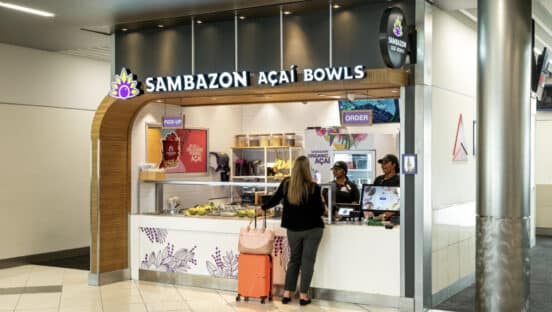Localita & The Badasserie may be tucked into the Fashion District of Downtown Los Angeles, and might even be the smallest quick serve in the world (Guinness is looking into it). But the four-week-old, 80-square-foot hole in the wall is quickly proving that even an eco-conscious restaurant with an all-vegan menu and tiny footprint can make a big impression on consumers.
Localita is a spinoff of Hollywood’s Locali Conscious Convenience, a deli and market that is the birthplace of the BadAss Breakfast Sandwich, from which Localita & The Badasserie spins half its name. The vegan BadAss Breakfast Sandwich, which includes sausage patty, soy-free Cheddar, chipotle sauce, and maple syrup on a sprouted multigrain English muffin, has a following in the community, even among non-vegans. The success of the BadAss was the inspiration for Localita & The Badasserie’s motto: “Finally… vegan food that tastes like it isn’t.”
Owner Melissa Rosen says the concept is “a fun, sassy take on vegan eating” and that the sandwiches are healthy, hearty, and satisfying.
“It’s a comfortable bridge for people who wouldn’t try [vegan],” she says. Part of that bridge, Rosen believes, is what she calls the “quirky, saucy branding.”
Unlike Locali, Localita & The Badasserie is 100 percent vegan. The menu includes four sandwiches that are a twist on the BadAss Breakfast Sandwich: the Sir Nasty with Sriracha and red onions; the Luigi Lover, similar to a meatball sub; the S. Daddy Mack, which is like a vegan fast-food burger; and the Tiki Time, which is Hawaiian-style with vegan bacon, barbecue sauce, and pineapple. There is also a Vegan Reuben (voted best in L.A.), as well as smoothies, soups, salads, fair-trade coffee, natural sodas, and snacks.
Rosen says the food is more than innovative ingredient combinations. “Our food is prepared with a lot of love,” she says. “The staff is a family. They’re encouraged to have a sense of ownership and responsibility. You can taste it in the food. We serve comfort food and people feel comforted by eating it because they know we care.”
Localita also strives to do right by the environment, which Rosen says is “the whole point.” Along with its vegan and locally sourced food, the small size of the restaurant—a counter, a bistro-sized table, a few chairs, a galley kitchen, a miniscule space for storage, four employees, and a bicycle for deliveries—plays an integral role that mandates eco-efficiency.
“We keep our food waste extremely low,” Rosen says. “Our sauces are used to make different things. We create completely new dishes without wasting ingredients. Our chipotle sauce on the BadAss Sandwich can become a salad-dressing base. It’s a challenge to see how much we can do in this small space.”
Those not wanting to compete for Downtown L.A.’s few open parking spaces still have easy access to the restaurant’s sandwiches. Localita’s curbside pick-up and bicycle delivery are only a text message away. In fact, Rosen’s staff encourages all of the store’s visitors to text their orders so their food is ready when they arrive, even when they dine in.
Localita’s innovative concept is on target with today’s consumer demand, says Lori Walderich, chief creative officer at IdeaStudio, a chain restaurant marketing and promotions firm.
“Trend-wise, they are definitely spot-on with the food stall concept,” Walderich says. “Perception-wise, a small space that is full of people is always better than a large space that is half empty. Given the size of this unit, all it will take is a couple of people standing at the window to convince passers-by that the place is worth trying.”
Rosen plans to franchise Localita & The Badasserie within the year, hoping to further spread the availability of healthy food choices through her commitment to organic, locally sourced, non-GMO foods. She says she also hopes to spread awareness of fair wages to employees, which she says encourages people to be “engaged, respectable members of the community.”
Rosen believes the reasonable start-up costs and the young, hip branding will make the brand especially appealing on college campuses and in urban settings.
As the brand prepares to expand, Walderich stresses “the brand experience must always stay consistent to its roots as the years go by.” There should also be a commitment to Localita’s unique, “homegrown” marketing, she says.
“There's often a tendency to re-do the branding and sometimes, if it's too slick and professional, it can have a negative effect and could send the perception that it has—pardon my expression—gone Hollywood,” she says.









